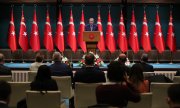Western ambassadors allowed to stay in Ankara
The expulsion of ten Western ambassadors from Turkey has been narrowly avoided. After the diplomats made a formal declaration to abide by Article 41 of the Vienna Convention on non-interference in internal affairs, President Recep Tayyip Erdoğan chose not to insist on their expulsion. But what is the fallout of this diplomatic confrontation?
A great victory for Erdoğan
Hürriyet is very pleased with the president's negotiating skills:
“Yet again, Erdoğan has stood his ground and achieved his goal. What happened? Firstly, he has shown that Turkey will tolerate being lectured to. Not for nothing do people say that Turkey is a great state. Secondly, President Erdoğan has achieved his goal through his tough approach. Thirdly, a serious crisis for Turkey was averted at the same time. Fourthly, Turkey has demonstrated its masterful crisis management. ... A serious economic threat has been averted. If the ambassadors of the ten states had been expelled, we would be hearing economic alarm bells today.”
The West must not ease up
The EU and the US must continue to urge Turkey to adhere to democratic and legal principles, the Financial Times admonishes:
“Turkey's western partners were wise to seek to calm the dispute by declaring their compliance with Article 41 of the Vienna Convention, which includes a duty for diplomats not to interfere in the internal affairs of host states. ... But while respecting their commitments, US and European capitals should continue to press for the release of Kavala - against whom the charges are flimsy - and for respect for rule of law. The further Erdogan departs from that, the deeper he will lead Turkey into an economic and political black hole.”
That's it for EU accession
After all the back and forthing, Dagens Nyheter is convinced:
“Turkey's EU membership application is dead in the water and must remain so as long as Erdoğan is the country's omnipotent leader. The declaration on Kavala which Germany and France have signed [which calls for swift resolution of the Kavala case] is and remains an exception. Too often, the European refugee deal of 2016 is considered more important than human rights. ”
A risky diversion
Erdoğan is just be trying to divert attention from the problems in his country with his attacks on the West, Ilta-Sanomat speculates:
“If Turkey had carried out Erdoğan's threat, it would have severely damaged the country's foreign relations - and in particular the Turkish economy, which is in chaos even without diplomatic confrontations. ... That is why Erdoğan's threat is not just motivated by defiance but also an extremely daring gamble. ... The economic crisis is making the citizens angry - and diminishing Erdoğan's popularity in the polls. The diplomatic attacks could be an attempt by Erdoğan to distract the public's attention from the country's economic problems and his own waning popularity.”
Tough luck for Kavala that he's Turkish
Cumhuriyet reminds readers just who the dispute with the ten ambassadors is actually about:
“Being Turkish abroad is already difficult, but it's even more difficult in Turkey. Because foreigners have the rights they possess in their own country even when they are in Turkey. But the same does not apply for Turks. When the US priest Brunson spoke out on democratic practices, he was arrested but immediately released after the US president intervened. When the Turk Osman Kavala does the same he goes to jail, but even if the European Court of Human Rights rules that he should be released, no one gets him out. Nobody is allowed to criticise this practice, because it's then seen as interference in Turkey's internal affairs - and Turkey maintains that no one is allowed to interfere with its independent judiciary.”

